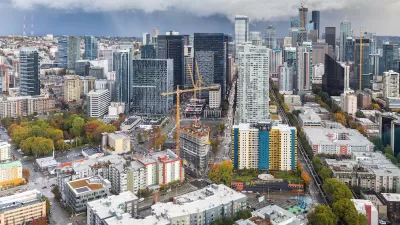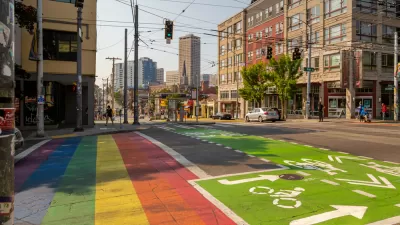Charging developers for improving local infrastructure impacted by their projects could boost transportation revenue, but permit applications in the city are slowing down.

he Seattle city council is once again weighing a proposal to institute transportation impact fees, which would impose a charge on new developments that would fund transportation improvements.
As Ryan Packer explains in The Urbanist, these fees are aimed at mitigating the impacts on local infrastructure and roads caused by new projects. “Transportation impact fees, a tool authorized by the state legislature as part of the Growth Management Act, are levied by more than 70 cities statewide but have never been used in Seattle.”
However, “the issue of adding additional fees on new housing during a well-identified affordability crisis is causing additional scrutiny of the idea.” The proposal is being appealed by a “shadowy group” called the Seattle Mobility Coalition, which claims that the city skimped on its environmental review of proposed development impact fees. As Packer notes, “an impact fee that discourages housing growth in Seattle, making sprawl more cost-competitive and drives up commute times would put more demand on the region’s transportation system overall, defeating the entire purpose of the impact fee program.”
Supporters of the fee see it as a replacement for revenue from the Move Seattle transportation levy, which expires next year. Meanwhile, development permit applications are slowing down, with a 62 percent decline in applications in the second quarter of 2023 from the previous year.
FULL STORY: Seattle Council Pushes Forward on Transportation Impact Fees

Study: Maui’s Plan to Convert Vacation Rentals to Long-Term Housing Could Cause Nearly $1 Billion Economic Loss
The plan would reduce visitor accommodation by 25,% resulting in 1,900 jobs lost.

North Texas Transit Leaders Tout Benefits of TOD for Growing Region
At a summit focused on transit-oriented development, policymakers discussed how North Texas’ expanded light rail system can serve as a tool for economic growth.

Why Should We Subsidize Public Transportation?
Many public transit agencies face financial stress due to rising costs, declining fare revenue, and declining subsidies. Transit advocates must provide a strong business case for increasing public transit funding.

How Community Science Connects People, Parks, and Biodiversity
Community science engages people of all backgrounds in documenting local biodiversity, strengthening connections to nature, and contributing to global efforts like the City Nature Challenge to build a more inclusive and resilient future.

Alabama: Trump Terminates Settlements for Black Communities Harmed By Raw Sewage
Trump deemed the landmark civil rights agreement “illegal DEI and environmental justice policy.”

Dear Tesla Driver: “It’s not You, It’s Him.”
Amidst a booming bumper sticker industry, one writer offers solace to those asking, “Does this car make me look fascist?”
Urban Design for Planners 1: Software Tools
This six-course series explores essential urban design concepts using open source software and equips planners with the tools they need to participate fully in the urban design process.
Planning for Universal Design
Learn the tools for implementing Universal Design in planning regulations.
City of Santa Clarita
Ascent Environmental
Institute for Housing and Urban Development Studies (IHS)
City of Grandview
Harvard GSD Executive Education
Toledo-Lucas County Plan Commissions
Salt Lake City
NYU Wagner Graduate School of Public Service





























